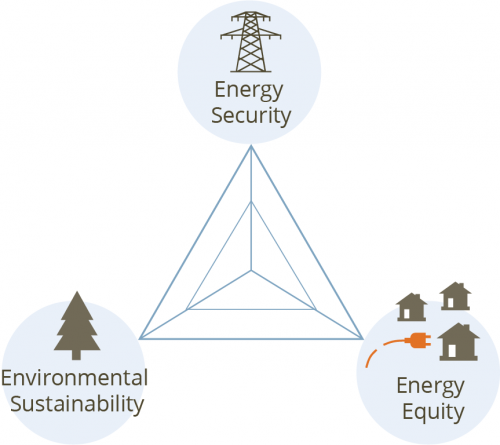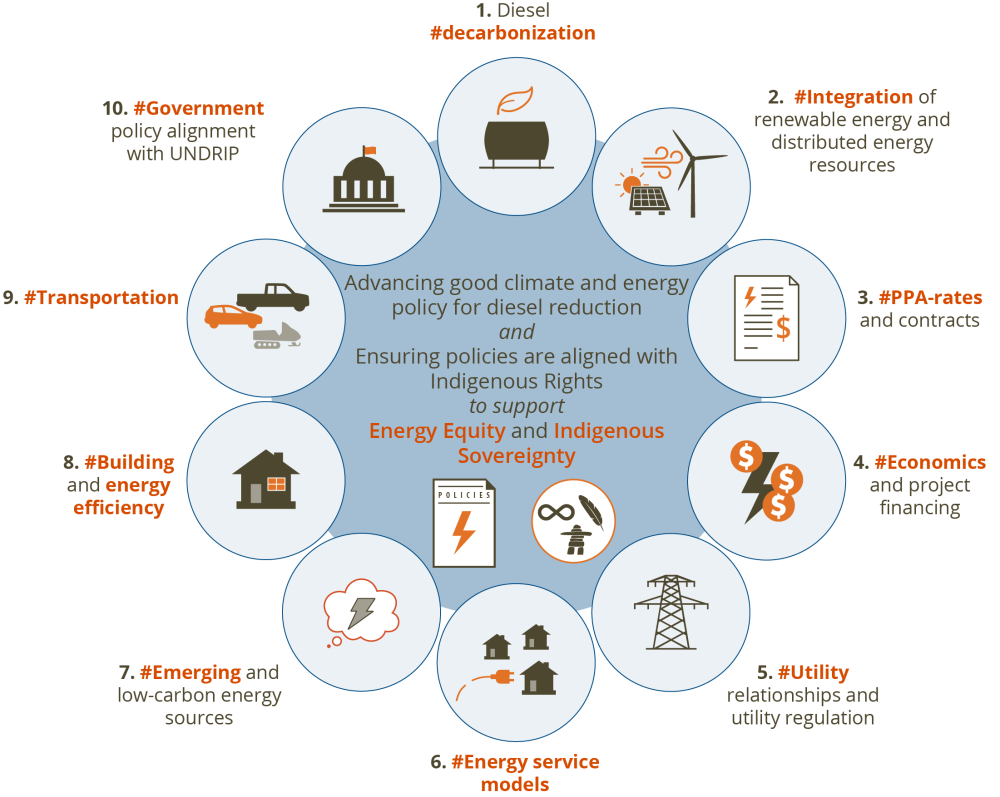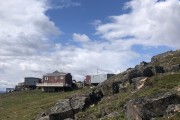Policies for transitioning Canada’s remote and largely Indigenous communities off fossil fuel while creating resilient and sustainable economies must balance multiple and conflicting priorities and be rooted in local knowledge.
Diesel has, for decades, been the primary source of energy in Canada’s most isolated regions. Ninety-nine per cent of the energy supplied to Nunavut’s 23 remote communities, for instance, is diesel generated. Nunavut has the highest diesel dependency of any province or territory, but it is not alone in its reliance on the high-polluting fossil fuel. The Pembina Institute’s latest research shows that remote communities consume almost 700 million litres of diesel and other fossil fuels per year to produce electricity and heat.
Diesel dependency locks communities into archaic energy systems and decades-old technology, further exposes their populations to the impacts of climate change, and increases health and environmental risks caused by diesel spills. This reliance on diesel, which is expensive to transport, also contributes to high fuel poverty rates across remote Indigenous communities. A household may be described as experiencing fuel poverty when it spends more than 10 per cent of its income on utilities. Provincial and territorial governments have responded by allocating huge subsidy budgets to ensure that people in these regions have a reliable supply of power and heat at affordable energy rates. But these subsidies, in many cases, just prolong the dependence on a technology of the past, and could be reallocated to other community needs if more affordable solutions can be found and energy policies encourage their adoption.
Energy policies and regulations for remote communities need serious attention
Energy transition is not being slowed by a lack of innovation or good alternatives to conventional fossil fuels — communities like Old Crow in Northern Yukon are showcasing the results of technological achievement. Rather, the two main requirements for acceleration of progress are:
- Building local, long-term deep capacity, knowledge and leadership in remote communities that advance their own visions of an energy transition leveraging economic windfalls from such ventures
- Developing climate and energy policy solutions that will support the shift away from fossil fuels — including policies to attract private capital (to complement existing public capital) for projects that support this transition.
On the former, energy transition that is based upon the insights of local leadership is indeed happening and the Indigenous clean-energy sector is soaring.
As for government energy policies and programs, although they continue to be rolled out, they are piecemeal and segregated across most jurisdictions. The energy transition in remote communities requires government leadership, ideas, and transformational action to successfully lower greenhouse gas (GHG) emissions, ensure affordable energy prices, create economic opportunities, and shift authority and decision-making in energy generation from colonial governments and utilities to Indigenous people.
Further, energy policies should aim beyond the basic goal of GHG emissions reduction and address three competing priorities (increasingly referred to as an energy trilemma): energy security, equitable access to energy sources (energy equity), and environmental sustainability. The Pembina Institute will explore holistic approaches to resolving these tensions — approaches framed by our policy work which is centered on the understanding that energy challenges faced by remote communities are not homogenous and solutions must take into consideration each community’s unique priorities, governance structures, climate, and geography.

Advocating for all-inclusive energy and climate policies through our framework of eight policy areas
 Energy policy options to reduce diesel consumption in remote communities are wide ranging. All have different purposes, lever points, and effects. An aggressive transition, considering the federal government’s commitment to eliminate diesel-powered electricity by 2030, will require various layers of policies that work in concert, with some incentivizing a switch to clean energy (like a renewable energy tax credit) and some disincentivizing fossil fuels (like carbon pricing). The right mix of policies is critical to better drive socio-technical transitions within Indigenous communities. The Pembina Institute’s jurisdictional review and scorecard of policies across Canada — our Power Shift in Remote Communities report — provides examples of the wide range of approaches and policies across provinces and territorial jurisdictions.
Energy policy options to reduce diesel consumption in remote communities are wide ranging. All have different purposes, lever points, and effects. An aggressive transition, considering the federal government’s commitment to eliminate diesel-powered electricity by 2030, will require various layers of policies that work in concert, with some incentivizing a switch to clean energy (like a renewable energy tax credit) and some disincentivizing fossil fuels (like carbon pricing). The right mix of policies is critical to better drive socio-technical transitions within Indigenous communities. The Pembina Institute’s jurisdictional review and scorecard of policies across Canada — our Power Shift in Remote Communities report — provides examples of the wide range of approaches and policies across provinces and territorial jurisdictions.
Through policy work done under our Renewables in Remote Communities (RiRC) program and the Indigenous Off-diesel Initiative (IODI), we are advancing work in two overarching and eight specific policy areas to support energy projects being led by Indigenous champions involved in the IODI program. The selected areas were chosen to capture the spectrum of barriers that Indigenous communities face when advancing diesel-reduction projects.

Watch for our new policy series
To share the progress being made on each energy policy area, we are launching Climate and energy policy advancements: Eliminating diesel in Canada’s remote communities. This series will provide more insight, details and analysis of each of the specific policy areas, with supporting research and stories from those involved in advocating for positive change where applicable. The series will show the interplay between different policies and will demonstrate the power and benefit of policy as we all work to eliminate diesel dependency in remote communities across Canada.
 First up: We will focus on policy regarding renewable energy integration, and are inviting your input. If you have something important to say about any of these policy areas — whether it is a story about direct experience in your communities, or interaction with the governments that are advancing policies or research — please get in touch with us. We want to help build on the important progress of the past few years.
First up: We will focus on policy regarding renewable energy integration, and are inviting your input. If you have something important to say about any of these policy areas — whether it is a story about direct experience in your communities, or interaction with the governments that are advancing policies or research — please get in touch with us. We want to help build on the important progress of the past few years.
Central to our policy analysis is the understanding that Indigenous peoples are the primary constituents of Canada’s remote communities, and any policy must directly align with their interests and address their concerns. We are dedicated to advancing reconciliation and to ensuring that Indigenous Rights and self-determination are embedded in climate and energy policy, and look forward to supporting others working toward similar goals.
Climate and energy policy advancements: Eliminating diesel in Canada’s remote communities
Publications in this series:
- Rethinking energy policy in Canada’s remote communities
- How to boost renewable energy integration in remote communities
- What’s a fair and equitable price for renewable energy in remote communities?
- Better government policies will unlock the cash remote Indigenous communities need for clean energy
- Reducing emissions from diesel generators in remote communities
- When business-as-usual is a barrier to clean energy
- From diesel dependency to energy empowerment
- Three clean energy options that could help replace diesel
- Remote communities transitioning to clean energy need better housing
- How remote communities should be included in the push to electrify transportation
- Government action on UNDRIP and the clean energy transition








